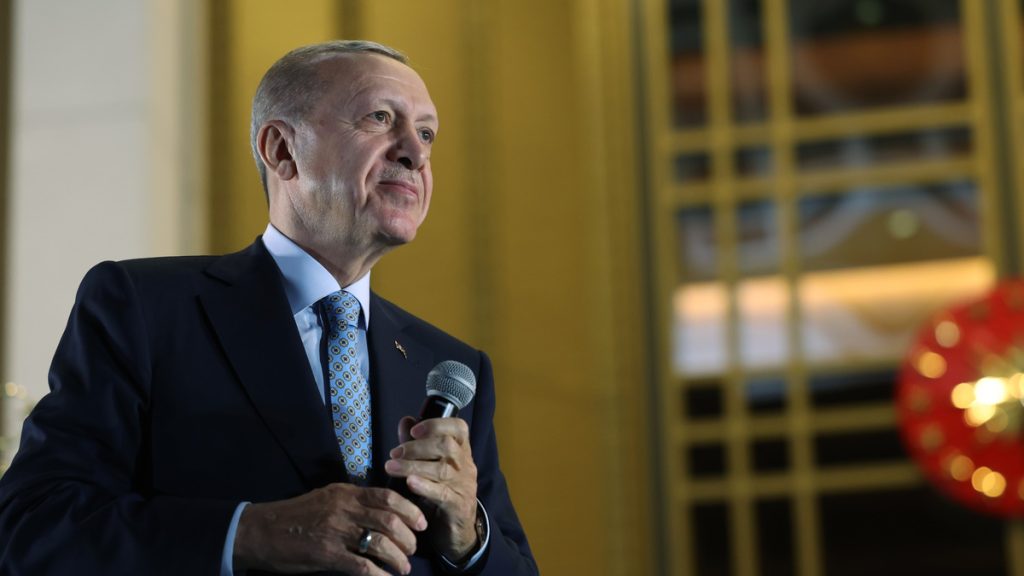On May 28, 2023, Recep Tayyip Erdogan officially won his bid for re-election as Turkey’s president. He defeated his challenger Kemal Kilicdaroglu by a 52.1% to 47.9% margin.
In winning re-election, Erdogan is the leader who has spent the most time in office in modern Turkish history. Founder of the modern Turkish republic Mustafa Kemal Ataturk previously held that record of time in office at 15 years, when he was president from 1923 until his death in 1938. Erdogan previously served as the mayor of Istanbul from 1994 to 1998 and Turkey’s prime minister from 2003 to 2014. Since 2014, Erdogan has served as the country’s president.
Upon defeating Kilicdaroglu, Erdogan will now serve his third term as president. In the previous first round of voting on May 14, Erdogan enjoyed a close to five-point advantage over Kilicdaroglu. However, the incumbent leader did not attain the 50% threshold that is needed to win outright in the first round of presidential elections.
Russian President Vladimir Putin was one of the most prominent world leaders to initially congratulate Erdogan for his successful re-election effort. He described Erdogan’s victory as “a natural result of your selfless work as the head of the Republic of Turkiye, clear evidence of the support of the Turkish people for your efforts to strengthen state sovereignty and conduct an independent foreign policy.”
“We highly appreciate your personal contribution to the strengthening of friendly Russian-Turkish relations and mutually beneficial cooperation in various areas,” Putin continued.
Iranian President Ebrahim Raisi also had positive words for Erdogan following his victory. He believes that Erdogan’s third presidential term will foster “friendly relations between Iran and Turkiye, which are based on strong historical, cultural, and religious bonds, good neighborliness, mutual respect and common interests of the two nations, will further strengthen.”
In his victory speech, Erdogan announced his desire to turn Turkey into an international hub for liquefied natural gas (LNG). He continued by noting that he will cooperate with Russia to construct an LNG hub in Thrace. He also promised to uphold family values and stand against Western ideological currents that try to poison Turkish culture and politics.
Erdogan’s time in office has witnessed Turkey go from a middling geopolitical actor to a potential wildcard that could potentially alter the balance of geopolitics depending on which side it swings towards. Over the last decade, Turkish and Western relations have been deteriorating as Turkey has looked eastward. For example, Turkey and China conducted joint exercises in Turkish airspace. Additionally, Turkey joined the Shanghai Cooperation Organization (SCO) as a dialogue partner.
Turkey’s acquisition of the Russian S-400 air defense system in 2017 was without a doubt the most controversial decision it made that angered the United States. This resulted in Turkey being shut out from the F-35 fifth-generation fighter jet program and triggered US CAATSA sanctions against Turkey.
Culturally speaking, Turkey is increasingly embracing an oriental outlook. As its secular Kemalist factions start to become increasingly irrelevant politically, Turkish politics will likely become more Islamist in nature. Findings from Turkish pollster Areda Survey showed the Turkish population’s growing hostility towards the West:
- 54.6% of Turks view the U.S. as the biggest security threat to their country while 51% think the biggest threat is Israel; 31.1% think it is the United Arab Emirates; and 30.7% think it is Saudi Arabia.
- 35.5% of Turks consider the U.S. unreliable; 32.8% think it is a colonialist state.
- 72.2% object to any kind of cooperation with the U.S.
- When asked with which one of the two countries Turkey should develop its relations, 78.9% said Russia against 21.1% who defended cooperation with the U.S.
- 58.2% of Turks think that Russia is their strategic ally.
- 69.3% think that the acquisition of the Russian S-400 system was the right decision.
In light of deteriorating relations between Turkey and the West, former national security adviser John Bolton became a member of the Turkish Democracy Project’s advisory council. He joined this non-profit “to shine a light on the darkening situation” in Turkey. Per its website, the TDP is “a nonprofit, non-partisan, international policy organization formed in response to Turkey’s recent turn away from democracy and toward authoritarianism.”
Bolton’s and other neoconservatives’ grievances with Turkey have largely been fueled by its growing rapprochement with Russia. Russia’s move to sell S-400s to Turkey is largely in line with the Primakov Doctrine that the late Russian diplomat Yevgeny Primakov pushed for. It’s a foreign policy doctrine with the aim of checking US influence and establishing a multipolar world order. Part of this doctrine has Russia exploiting contradictions within NATO by playing Turkey — the military alliance’s most authoritarian member — off other NATO members.
Turkey has a longstanding habit of hedging and playing great powers off against each other to maximize its power on the world stage. With Erdogan still at the helm, Turkey will continue hedging its bets and playing the West off the East.
As the geopolitical gravity shifts towards Eurasia, Turkey will likely commit to the East as it forges alliances and strategic partners for its own benefit.
